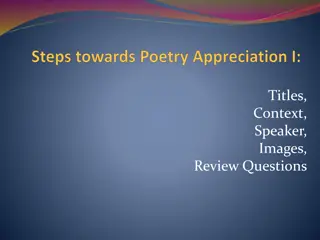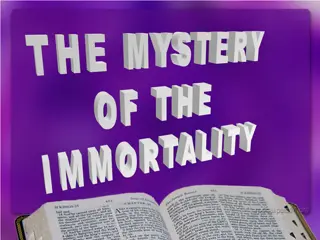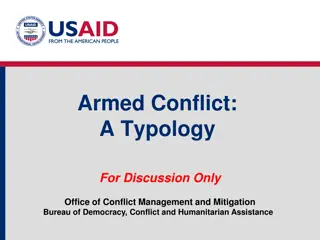Conflict Between Soul and Body in Andrew Marvell's Poem
Andrew Marvell's poem "A Dialogue Between the Soul and Body" depicts the ongoing conflict between the human Soul and Body. The Soul feels trapped within the Body, while the Body perceives the Soul as a tyrant imposing restrictions. This hostile debate sheds light on the deep dissatisfaction both entities feel, yearning for different resolutions. The poem explores the intricate relationship between physical existence and spiritual essence, reflecting on the complexities of human nature.
Download Presentation

Please find below an Image/Link to download the presentation.
The content on the website is provided AS IS for your information and personal use only. It may not be sold, licensed, or shared on other websites without obtaining consent from the author. Download presentation by click this link. If you encounter any issues during the download, it is possible that the publisher has removed the file from their server.
E N D
Presentation Transcript
A DIALOGUE BETWEEN THE SOUL AND BODY - Andrew Marwel
Andrew Marvell was an English metaphysical poet, satirist and politician who sat in the House of Commons at various times between 1659 and 1678. During the Commonwealth period he was a colleague and friend of John Milton.
The poem, A Dialogue Between the Soul and Body by Andrew Marvell describes the conflict between the human Body and the human Soul, each attributing its troubles and sufferings to the other. The Soul feels that it is a prisoner inside the Body while the Body feels that the Soul is a tyrant imposing all kinds of restraints and restrictions upon the Body.
Soul O Who shall, from this Dungeon, raise A Soul inslav'd so many wayes? With bolts of Bones, that fetter'd stands In Feet ; and manacled in Hands. Here blinded with an Eye ; and there Deaf with the drumming of an Ear. A Soul hung up, as 'twere, in Chains Of Nerves, and Arteries, and Veins. Tortur'd, besides each other part,1 In a vain Head, and double Heart.
Like a presidential debate, this dialogue is a hostile, mud- slinging, pull-no-punches argument between two very upset beings: the soul and the body. Although they're both unhappy about the same thing (being alive together), they express themselves in different ways. The soul is unhappy about the physical pain of being inside a body, forced to live next door to arteries and livers and to feel every ache and pain. What it really wants is the body's death. That way the soul can return to heaven and live happily (and dis-embodied-ly) forever.
Well, it's complicated. It's pretty clear what Marvell means by a body, but a soul is a slippery, not-so-definable thing. From the body's stanzas, we know that the soul is in charge of emotions, morality, and being alive in general. It's like a conscience, a brain, and the life force all rolled up into one. Today we assume that the brain is part of the body, made up of the same cells, fed by the same blood, directing everything else that goes on. But back in the seventeenth century there was a mind- body split. The soul-mind and the body were seen as distinct entities.
The body, on the other hand, can't live forever and escape to heaven, and for that reason it hates the soul for giving it life in the first place. Walking around upright is bad enough, but the worst part about having a soul is the emotional pain. The body doesn't want to feel happy or sad, and it especially doesn't want to have the moral capacity to commit sin.
Body O who shall me deliver whole, From bonds of this Tyrannic Soul? Which, stretcht upright, impales me so, That mine own Precipice I go; And warms and moves this needless Frame: (A Fever could but do the same.) And, wanting where its spight to try, Has made me live to let me dye. A Body that could never rest, Since this ill Spirit it possest.
O who will liberate me in my entirety from the restraints of this dictatorial Soul? The Soul is like a thin, pointed stake driven into me and left there. The Soul is stretched upright in me, forcing me into an unnatural, stiff, and unbending posture so that I feel like a walking precipice always in danger of collapsing and getting destroyed. The Soul certainly keeps me warm and animates me, but I do not need either warmth or the capacity to move.
Those results can be achieved by me even through a fever which can shake me and give me heat. Actually the Soul, having no other outlet for its malice, gives life to me only in order to let me die afterwards. Indeed, I am in no position to get any rest at any time because I am possessed by the Soul which is an evil spirit.
Soul What Magic could me thus confine Within anothers Grief to pine? Where whatsoever it complain, I feel, that cannot feel, the pain. And all my Care its self employes, That to preserve, which me destroys: Constrain'd not only to indure Diseases, but, whats worse, the Cure: And ready oft the Port to gain, Am Shipwrackt into Health again.
I do not understand what magic works to keep me as a prisoner here and to force me to suffer for the sorrows of the Body. I, who is supposed to be incapable of feeling any pain, do yet feel pained whenever the Body suffers from any ailment,. It is strange that I should have to devote all my care to the preservation of this Body which has a tormenting effect on me and which, thus, tries to wreck me.
I am forced not only to endure the diseases of the Body, but worse than that is the fact that I have to endure the treatment which the Body undergoes for its diseases and which restore it to health. The restoration of the Body to health is even worse for me than the diseases which afflict it and which make me suffer also. Whenever the Body seems to be threatened with death, I have the feeling that I shall soon be released from my imprisonment and shall then go back to heaven; but when the Body gets well again, I feel like sailors who have been ship-wrecked.
Body But Physick yet could never reach The Maladies Thou me dost teach; Whom first the Cramp of Hope does Tear: And then the Palsie Shakes of Fear. The Pestilence of Love does heat : Or Hatred's hidden Ulcer eat. Joy's chearful Madness does perplex: Or Sorrow's other Madness vex. Which Knowledge forces me to know; And Memory will not foregoe. What but a Soul could have the wit To build me up for Sin so fit? So Architects do square and hew, Green Trees that in the Forest grew.
But no medicine can ever cure the diseases which you, O Soul, impose upon me. When you experience any hope, I am racked with cramp. When you experience any fear, I feel shaken as if by palsy. If you experience love, I am fevered with the plague. When you experience hatred, I am consumed with internal ulcers. If you experience joy, I feel madly elated. If you experience grief, I feel madly depressed. It is your knowledge which makes me know all this, and it is your memory which does not let me forget any of these things.
Even though this poems seems to end exactly where it began with body and soul equally ticked off reading the dialogue lets you in on some pretty sweet philosophical insights. Marvell doesn't shy away from the big questions. You get to think about where the soul-mind-life force ends and where the body begins, who's in charge and why it matters. Which pain is worse: emotional or physical? This debate's got it covered. What about morality, death, and the possibility of life afterward? To explore these big questions, and much, much more, dive right in.
Critical Appreciation: The poem, A Dialogue Between the Soul and Body, presents a fundamental aspect of our human predicament. The conflict here is in man himself of irreconcilable opposites. Paradox alone can do justice to our fallen condition: our vision blinds us, and our hearing makes us deaf.
By stressing his despair at the separation in such a forcible manner, Marvell compels us to realize the infinite sadness of our fallen condition, thus, indirectly drawing attention to the nature of the perfection that was lost. Besides, the poem is also remarkable for its simplicity of language and its singing quality. The feeling expressed through the poem is strong, sincere, and spontaneous. Over, the poem consists of all the quality that we expect in a good lyric.























